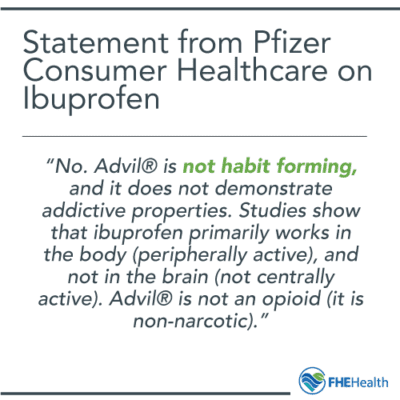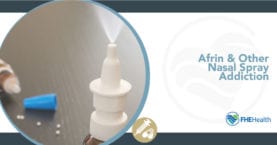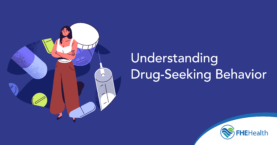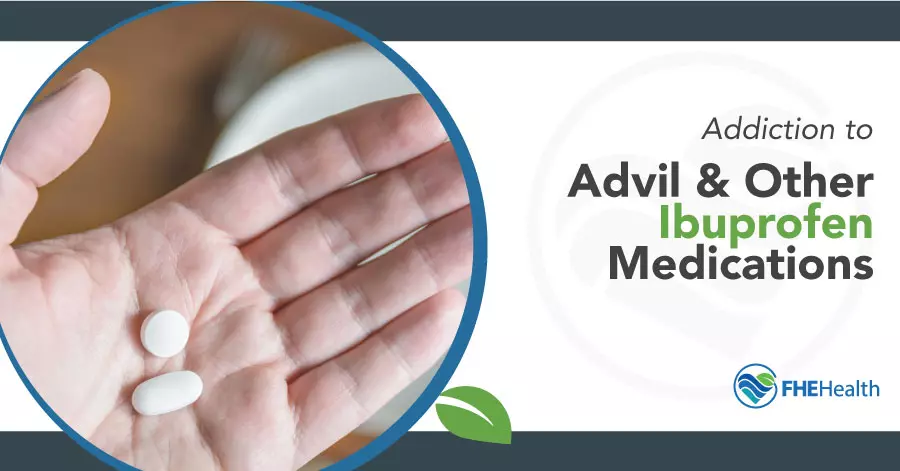
When most people think of drug addiction, they associate it with illicit drugs like cocaine, heroin or crystal meth or think of prescription drugs like fentanyl, OxyContin and morphine. While it’s true that millions of Americans struggle with addiction to illegal or prescription drugs, Advil and other over-the-counter NSAID medications are a big problem, too. Many people take these drugs daily and around the clock, at higher doses than recommended. Is ibuprofen addictive? This “drug of choice” may not be as inherently addictive a substance as cocaine, heroin or other illicit drugs, but it can still lead to a behavioral habit with harmful consequences for health.
What Are NSAID Drugs?
NSAIDs stands for nonsteroidal anti-inflammatory drugs, which help reduce fever, pain and inflammation. Common NSAIDs available over the counter include:
- Ibuprofen (Advil and Motrin)
- Naproxen (Aleve)
- Aspirin (Bayer and Ecotrin)
These types of NSAIDs differ in their strength, length of action and specific uses. Ibuprofen, for example, is a popular choice for headaches, muscle pain, cramps and arthritis. It works fast and is gentler on the stomach than aspirin. However, compared to naproxen, ibuprofen is shorter-acting. That means it may require more frequent dosing for relief.
How Safe Is Advil?
Advil and other NSAIDs are generally considered safe when taken for the short term and as directed. For many people, controlling pain without these medications simply isn’t possible. According to the Centers for Disease Control and Prevention, 20.4% of American adults suffer from chronic pain.
In cases where natural, medication-free methods of pain management don’t suffice, choosing an over-the-counter drug like Advil remains a safer alternative to prescription painkillers like oxycodone or hydrocodone. However, because Advil can be behaviorally addictive, this should be considered in discussions about safety.
Common Side Effects of Ibuprofen
All medications come with the potential for side effects, even when used correctly. The most frequently reported negative symptoms include stomach
pain, nausea, diarrhea, heartburn, gas or bloating. Other side effects of OTC
ibuprofen include dizziness, headache, nervousness or ringing in the ears. Unfortunately, when people experience these side effects, they may mistakenly believe that they need a bigger dose of ibuprofen to get the relief they seek.
Serious Side Effects of Ibuprofen and NSAID Overuse
While ibuprofen and NSAIDs are generally classified as non-narcotic and non-habit-forming drugs, improper use can still be dangerous. When self-treating pain with OTC ibuprofen, the maximum dose is 1,200 milligrams per day for no more than 10 days (unless otherwise directed by a doctor). Long-term overuse may pose serious health risks, including:
- Gastrointestinal bleeding
- Ulcers
- Kidney damage
- Liver toxicity
- High blood pressure
- Heart attack or stroke
The misuse of NSAIDs may even lead to severe poisoning or death. According to one recent study, ibuprofen is the most common NSAID associated with overdose cases, with 29% of overdoses being the result of ingesting ibuprofen alone.
Is Ibuprofen Addictive? How People Get Hooked
Most people take Advil or other NSAID drugs to relieve temporary pain. However, if someone has chronic pain issues, a one-time use that proves effective can grow into a longer-term habit or “process addiction.”
Unlike a substance addiction (which is addiction to the drug itself), a process addiction is an addiction to the “reward” (pain relief) and the behaviors associated with taking Advil. And yes, you can get addicted to Tylenol or acetaminophen in much the same way. Many people with psychological dependence on pain relievers find support in a trusted treatment program for process addiction. These programs are specially designed to help men and women with nonchemical, behavioral addictions.
The Link Between Ibuprofen Addiction and Anxiety Disorders
In some cases, a dependency on Advil and NSAIDs may be masking anxiety issues. One mental health condition that commonly co-occurs with Advil addiction is somatic symptom disorder. Closely related to hypochondria (which also co-occurs with Advil use disorder), somatic symptom disorder is characterized by an obsessive preoccupation with pain and other physical symptoms.
The good news is that these anxiety disorders are conditions that can be successfully diagnosed and treated. If you’re unsure whether anxiety or addiction (or both) may be driving your ibuprofen habit, consult a mental health professional to help figure out what’s going on. A behavioral health treatment program for anxiety can get to the root of the problem and decrease compulsions before your health takes an irreparable hit.
What Are Some Signs of Ibuprofen Addiction?
Is ibuprofen addictive? Can it cause withdrawal symptoms? Here at FHE Health, we take the view that an addiction isn’t just about getting “high” — it’s a complex combination of behaviors, obsessive thoughts, physical dependencies and compulsions that can develop in relation to a wide range of substances and situations.
We understand that the overuse of any OTC medication can lead to an addiction that manifests in numerous behavioral signs and symptoms. Experience with any one of these symptoms may indicate an addiction to ibuprofen or other NSAIDs:
- Feeling like you can’t get through the day without taking Advil
- Trouble sleeping if you don’t take Advil
- Feeling the need to always have a stash of Advil nearby (keeping bottles in your car, office and locker and in multiple spots throughout your home)
- Becoming angry, anxious or depressed when you don’t have access to Advil
- Needing to take ever-increasing doses of NSAIDs over time to achieve relief
- Experiencing negative changes to your diet and bathroom habits as a result of Advil
- Experimenting with different ways to take ibuprofen, such as crushing and snorting the tablets, in an effort to increase the effects
- Trying out different drug combinations with Advil, such as drinking alcohol while taking Advil, popping caffeine pills in conjunction with ibuprofen or mixing Advil with other OTC painkillers
- Trying to stop using ibuprofen without success
Rebound Headaches: A Sign of Ibuprofen Withdrawal
When used too frequently or excessively, ibuprofen is also known to trigger
rebound headaches (or medication overuse headaches). That means that the very same medicines that initially provide relief may actually cause more pain and discomfort in the long run.
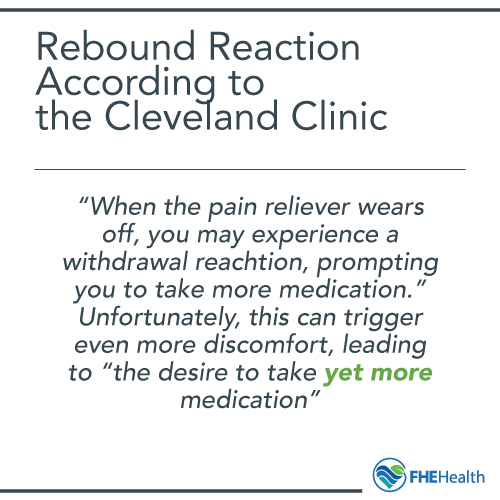
According to the Cleveland Clinic, when pain relievers wear off, people may experience a withdrawal reaction that prompts them to take more medication. As this vicious cycle continues, the headaches become more painful and chronic, leading to the desire to take even more medication.
Rebound headaches get progressively worse without proper treatment. Some people may be able to gradually reduce their overuse of NSAIDs under the guidance of a doctor, while others may need to be detoxified and more carefully monitored.
Ibuprofen Treatment and Help
Treatment for a behavioral or process addiction and/or co-occurring anxiety disorder can be very effective at helping people break free of a harmful habit that’s destroying their quality of life. Usually, patients benefit most from an initial period of detox from the substance, immediately followed by inpatient or outpatient treatment or both.
During treatment, patients receive individual and group therapies to address the causes of their compulsive behaviors. They gain new coping skills and learn how to identify and replace the unhealthy thought patterns that may have been triggering their addictive behaviors. Upon completion of rehab, many patients do well with longer-term individual therapy on a regular basis. This helps them maintain and reinforce their recovery and lowers their risk of relapse.
Concerned About Your Advil Use? We’re Here to Help
Many people mistakenly believe OTC medications can’t be abused because these drugs don’t cause any sort of intoxication like alcohol and street drugs do. Unfortunately, many OTC medications can be addictive in their own way.
If you’re concerned about how much ibuprofen you’re taking or the impact your Advil use is having on your health, call us at FHE Health. Our team of compassionate, experienced addiction experts is available to speak with you about your concerns — 24 hours a day, 7 days a week.
FAQs: Managing Advil and NSAID Use
Q: Is Advil addictive?
A: No, it is not chemically addictive like an opioid. However, it can grow into a long-term habit, also called “process addiction.” This happens when taking the pill becomes a routine response to pain. Over time, the person relies on the ritual of taking the pill rather than treating the underlying cause of the pain.
Q: Does “Over-the-Counter” mean it is safe?
A: No. Safety is dose-dependent. Using ibuprofen daily causes physical damage regardless of its legal status. Regular use is a leading cause of stomach ulcers, internal bleeding, and kidney failure. Many emergency room visits for internal bleeding are caused by standard over-the-counter doses.
Q: Why does taking too much damage the body?
A: Advil works by stopping enzymes that cause pain. However, those same enzymes are required to produce the mucus that protects your stomach lining and keeps your kidneys functioning. When you take Advil constantly, you stop your body from protecting its own organs.
Q: What are the signs of a “habit” versus medical use?
A: You have a habit if you exhibit the following behaviors:
- Taking the medication when you are not currently in pain
- Taking medication “just in case”
- Feeling anxious or panicked if you do not have the pills with you.
- Increasing the dose because the standard dose no longer works.
- Hiding the amount you take from others.
Q: What are “rebound headaches”?
A: This is a medical cycle called Medication Overuse Headache. If you take pain relievers too often, your brain becomes oversensitive. When the medicine wears off, the brain triggers a new headache. This forces the user to take more medicine, which then causes the next headache, perpetuating the cycle of overuse.
Q: How can I stop overusing Advil?
A: The user must acknowledge that the drug is causing physical harm to their organs. Because the body has become dependent on the medication to function, stopping may cause a temporary increase in pain. A doctor must oversee a transition to a different treatment plan to avoid further damage to the stomach and kidneys.
